Computer Solutions for Diagnostic Medical Devices: Immunoassay Analyzers
During the COVID-19 Era
The medical care we receive has improved greatly over the years, thanks to technological advance-ments that allow for earlier and accurate diagnoses that lead to more effective treatments. New challenges have arisen during the COVID-19 pandemic. The COVID-19 pandemic has changed the importance of serology testing for the presence of the antibody created from having been exposed to the virus. There is a race to learn and defeat the virus – and immunoassay testing is key to diagnosis, treatments, quarantine decisions, the future of a vaccine and the cure for COVID-19.
The advancement of immunoassay analyzers, which are medical instruments used to diagnose diseases and other abnormalities within our system, as well as help confirm our health status, is crucial to help us meet the incremental demand from the pandemic. With the help of recent computer technology, biochemical testing has taken a new leap in turnaround time and accuracy. These machines offer higher efficiency levels and more tests can be performed to deliver faster and more accurate results.
Deeper Look into Immunoassays
 Immunoassays are biochemical tests that involve detecting the presence of specific substances and determining the amount of those substances in various sample types such as blood, urine, plasma and more. These can be detected through the use of antibodies and antigens as reagents. Antigens – such as bacteria, proteins, antibiotics, peptides, lipids and so on – are substances that can stimulate the immune system to produce antibodies. In turn, our immune system uses these antibodies to fight the antigens and eliminate them.
Immunoassays are biochemical tests that involve detecting the presence of specific substances and determining the amount of those substances in various sample types such as blood, urine, plasma and more. These can be detected through the use of antibodies and antigens as reagents. Antigens – such as bacteria, proteins, antibiotics, peptides, lipids and so on – are substances that can stimulate the immune system to produce antibodies. In turn, our immune system uses these antibodies to fight the antigens and eliminate them.
Specific antigens will only produce specific antibodies, which makes it easy to identify the presence of a particular substance. For example, the FDA recently authorized the first antigen test to help with rapid testing for detection of the COVID-19 virus Ribonucleic acid (RNA) and its gene. The fastest test can return positive or negative results in as little as five minutes using a point-of-care test unit that can be deployed in hospitals, physician offices and urgent care clinics.
Clinics can detect whether a patience has HIV by conducting an immunoassay test to look for antibodies that are produced as a result of this disease. Prostate cancer also can be detected with the Prostate-Specific Antigen (PSA) test. Many more diseases can be detected with the use of the immunoassay analyzers.
Testing for the Presence of the COVID-19 Antibody
Serology test assay kits are being developed by immunoassay analyzer equipment makers and large laboratories. High throughput machines can finish their job of up to 400 or more kits per hour depending on the size and efficiency level. Each machine relies on an industrial computer to control its functions and performance. Advanced computers are commonly integrated into immunoassay analyzers. Desired performance and functionality per each model are determined by each computer’s CPU choice, available I/Os and other features to deliver a fail-safe, high uptime machine that laboratories can rely upon with heavy usage.
How Advanced Immunoassay Analyzers Improve the Process and Patient Care
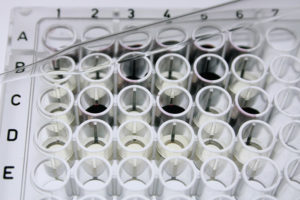 Faster and more accurate results are highly achievable via the use of current technology. Immunoassay analyzers have become highly automated over the years. In effort to reduce human errors and enhance speed, machines with advanced capabilities and high throughput rate are now dominating the industry. Laboratories with investments on these instruments are able to improve their productivity level with confidence. Leading medical instrument manufacturers for the device are offering higher flexibility and comprehensive features with their analyzers that include scalability, simplicity of operations, built-in quality control, streamlined maintenance and inventory management. They also offer the benefits of enhanced procedure consistency that can help reduce training and labor costs. These value propositions are clearly meant to benefit laboratories and healthcare institutions using the device. It also helps support better patient care and improve treatment plans.
Faster and more accurate results are highly achievable via the use of current technology. Immunoassay analyzers have become highly automated over the years. In effort to reduce human errors and enhance speed, machines with advanced capabilities and high throughput rate are now dominating the industry. Laboratories with investments on these instruments are able to improve their productivity level with confidence. Leading medical instrument manufacturers for the device are offering higher flexibility and comprehensive features with their analyzers that include scalability, simplicity of operations, built-in quality control, streamlined maintenance and inventory management. They also offer the benefits of enhanced procedure consistency that can help reduce training and labor costs. These value propositions are clearly meant to benefit laboratories and healthcare institutions using the device. It also helps support better patient care and improve treatment plans.
Immunoassay analyzers are often broken down into models with different processing capabilities, oftentimes based on demand of the unit or volume. Most medical instrument companies offer different reagents and assays that work in conjunction with the analyzers, many are designed for specific type of tests. For example, COVID-19 PCR and serology tests require specific assay kits and reagents to detect the virus or the antibody. The immuno- assay analyzers used by laboratories, depending upon their size and throughput rate, will determine how fast the patients can be notified and treatment plans provided.
Another example is prostate health diagnosis. It can be more accurately observed with a test that uses an assay made specifically for prostate health check. Specific thresholds for different age groups and a thorough report that requires peer review for higher confidence level of the results can be offered as a part of the procedure. A specialized prostate assay kit may require specific blood tests processed through the analyzers that could yield a score or reading that provides more information on the results and the patient’s potential issues.
Technologies That Drive the Success of Advanced Immunoassay Analyzers
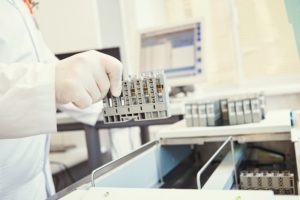 With different levels of demand and the various types of healthcare facility’s needs, the analyzers are often being evaluated by their processing capabilities, reliability and ease of use. The differences in needs for a facility with an annual test volume of below, for example, 10,000 vs. higher than 80,000 and the required throughput per hour rate would dictate the type of immunoassay analyzers needed. These machines are mission-critical in nature and each requires the use of an industrial computer that is capable of operating 24/7 with high dependability and also with matching processing power to perform complex tasks. Embedded motherboards or systems are integrated into these devices to control their operations. Touch panel PCs or display monitors made specifically for healthcare environments can also be integrated for use as a user interface for the analyzers. These motherboards, embedded systems and touch panel computers should offer rich I/Os that are designed for expansion and ease of customization. Some offer unique features such as reversed CPU for better heat dissipation and easy integration into small enclosures. With COVID-19 rapid testing compact-sized equipment, these purposely-designed motherboards are ideal for integration to control the operation. The considerations can also include future-proofed computer solutions with high interoperability with software and other peripherals. These key features are highly desirable for medical device OEMs/ODMs.
With different levels of demand and the various types of healthcare facility’s needs, the analyzers are often being evaluated by their processing capabilities, reliability and ease of use. The differences in needs for a facility with an annual test volume of below, for example, 10,000 vs. higher than 80,000 and the required throughput per hour rate would dictate the type of immunoassay analyzers needed. These machines are mission-critical in nature and each requires the use of an industrial computer that is capable of operating 24/7 with high dependability and also with matching processing power to perform complex tasks. Embedded motherboards or systems are integrated into these devices to control their operations. Touch panel PCs or display monitors made specifically for healthcare environments can also be integrated for use as a user interface for the analyzers. These motherboards, embedded systems and touch panel computers should offer rich I/Os that are designed for expansion and ease of customization. Some offer unique features such as reversed CPU for better heat dissipation and easy integration into small enclosures. With COVID-19 rapid testing compact-sized equipment, these purposely-designed motherboards are ideal for integration to control the operation. The considerations can also include future-proofed computer solutions with high interoperability with software and other peripherals. These key features are highly desirable for medical device OEMs/ODMs.
These analyzers can also offer a variety of value-added features. For example, some analyzers come with refrigerated storage for the reagents and test subjects for added convenience and time-saving which, in turn, result in higher productivity level. Some offer specific features and reporting to work with specialized assays. All features require interoperability among the analyzer’s hardware, software and other peripherals and are crucial for the device to deliver its complete capabilities. Designing such instruments is a complex and lengthy process. The Federal Food and Drug Administration’s approval plays a key role in determining the success or failure of these medical devices and the certification process can be costly and lengthy. Choosing the right hardware for the device is among the most important success factors for medical device manufacturers.
Axiomtek Medical Computer Solutions and Services
Axiomtek offers a wide range of high quality fanless embedded systems, embedded motherboards and medical-grade to light or heavy-duty touch panel computers, which have been selected by world-renowned medical device manufacturers, OEMs and ODMs for many complex medical applications.
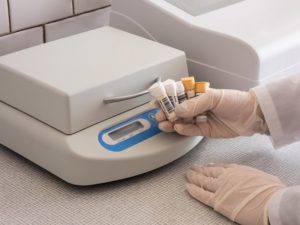 Axiomtek’s comprehensive product lines of fanless embedded systems feature high performance, scalable computing power and high flexibility to serve as the brains of the immunoassay analyzers’ operation. They are designed with ease of customization in mind. Our embedded motherboards also offer easy-to-integrate designs with rich features and come in a variety of form factors.
Axiomtek’s comprehensive product lines of fanless embedded systems feature high performance, scalable computing power and high flexibility to serve as the brains of the immunoassay analyzers’ operation. They are designed with ease of customization in mind. Our embedded motherboards also offer easy-to-integrate designs with rich features and come in a variety of form factors.
Our UL 60601-1/EN 60601-1-certified medical touch panel computers are manufactured in ISO 13485 facilities with spill-proof antimicrobial enclosures. They come in a variety of sizes and types of touch screens, and have the ability to connect with peripherals like RFID scanners. They have been used as a user interface to manage the unit’s operation and communicate procedure requirements and other key data. They are also used as a reporting tool and more.
Similarly, if medical device OEMs or ODMs prefer a regular touch panel PC or display monitor to be integrated as the user interface of the device, Axiomtek offers comprehensive product lines of both. They are built to last and offer many useful features including a variety of brightness and various types of touch screens with backlight features. Learn more here.
We also offer design engineering and value-added services to support medical device manufacturers, OEMs and ODMs throughout all stages of their device development process. With more than 25 years of expertise in providing board- and system-level design assistance, Axiomtek has continued our commitment to deliver high quality, purpose-built computer solutions and first-in-class services to help our customers successfully and effectively achieve their project goals.
Product Showcase
CAPA13R – Compact 3.5-Inch AMD Ryzen™ Motherboard with Extensive Graphical Capabilities
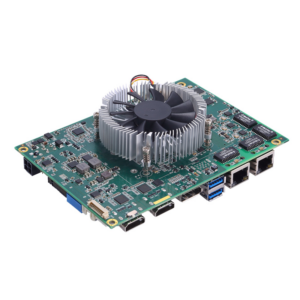
- Powerful onboard AMD RYZEN™ Embedded V1807B/V1605B processor
- Reversed CPU design to aid with heat dissipation and easy integration in space constraint enclosures
- 3D and 4K graphics through the integrated AMD Radeon™ RX Vega graphics for graphics intensive applications such as medical imaging and 3D simulators
- Offers quad-view display through two HDMI, one DisplayPort and one LVDS
MANO521 – Powerful Mini-ITX Motherboard for High Throughput Machines
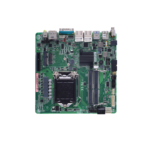
- Advanced LGA1151 socket 9th/8th generation Intel® Core™ i7/i5/i3 processor with Intel® H310/Q370 chipset
- Two 260-pin DDR4-2400/2666 SO-DIMM for up to 32GB system memory
- Feature-rich with two COMs, four USB 3.0, four USB 2.0, two SATA-600, mSATA and M.2 Key M (NVMe)
- Highly expandable with PCIe x4, M.2 Key E and PCI Express Mini Card slots
PICO51R – Flexible Pico-ITX Motherboard with Reversed CPU Design
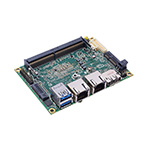
- Scalable CPU options with 7th generation Intel® Core™ i7/i5/i3 or Celeron® processors
- Reversed CPU design to aid with heat dissipation and easy integration in space constraint enclosures
- Highly expandable with M.2 Key E and M.2 Key B
- Intelligent remote management features with Intel® Active Management Technology (AMT) 11
eBOX710-521-FL – Advanced Workstation-Grade Fanless Embedded System for High Capacity Analytics
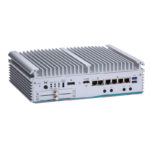
- Scalable CPU options with Intel® Xeon®, 9th/8th generation Intel® Core™ i7/i5/i3 or Celeron®processors
- Features two DDR4 ECC/non-ECC for up to 64GB system memory and dual swappable 2.5″ SATA HDD drive bays with RAID 0 & 1
- Rich features including flexible I/O window, six GbE LANs, six USB 3.2 and one PCIe x4 expansion slot
- Supports triple-view display through DVI-I, HDMI and DisplayPort
P6157W-V2 – Robust Industrial LCD Monitor for User Interface
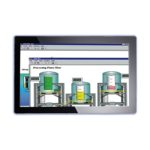
- 15.6-inch WXGA TFT display with projective capacitive multi-touch and 400 nits of brightness
- Features NEMA 4/12 (IP65) compliant flat panel monitor
- I/O options include one USB (for touchscreen version), one audio (Line-in) and one screw-type or Phoenix-type power input
- Supports multi-signal inputs with VGA, HDMI and DVI
MPC103-845 – Compact Medical-Grade 10.1-Inch Touch Panel Computer
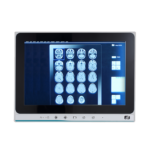
- Features EN 60601-1, CE and FCC certifications
- WXGA TFT LCD display with LED backlight and IP65-rated front bezel
- Powered by Intel® Celeron® Processor N3060
- Feature-rich with two GbE LANs, two COMs, two USB 3.0, two USB 2.0, one audio (Line-out) and optional support for RFID
GOT115-319 – Versatile Feature-Rich 15-Inch TFT Fanless Touch Panel Computer
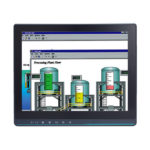
- IP65-rated design with 300 nits of brightness
- Scalable CPU options with Intel® Celeron® processor N3350 or Intel® Pentium® processor N4200
- Feature-rich with two GbE LANs, two COMs, two USB 3.0, two USB 2.0, RFID support and optional wireless module
- Offers external AT/ATX mode selection switch and programmable OSD function key
Contact us via email at medicalsolutions@axiomtek.com, or call 1-888-GO-AXIOM (1-888-462-9466) for more information.

